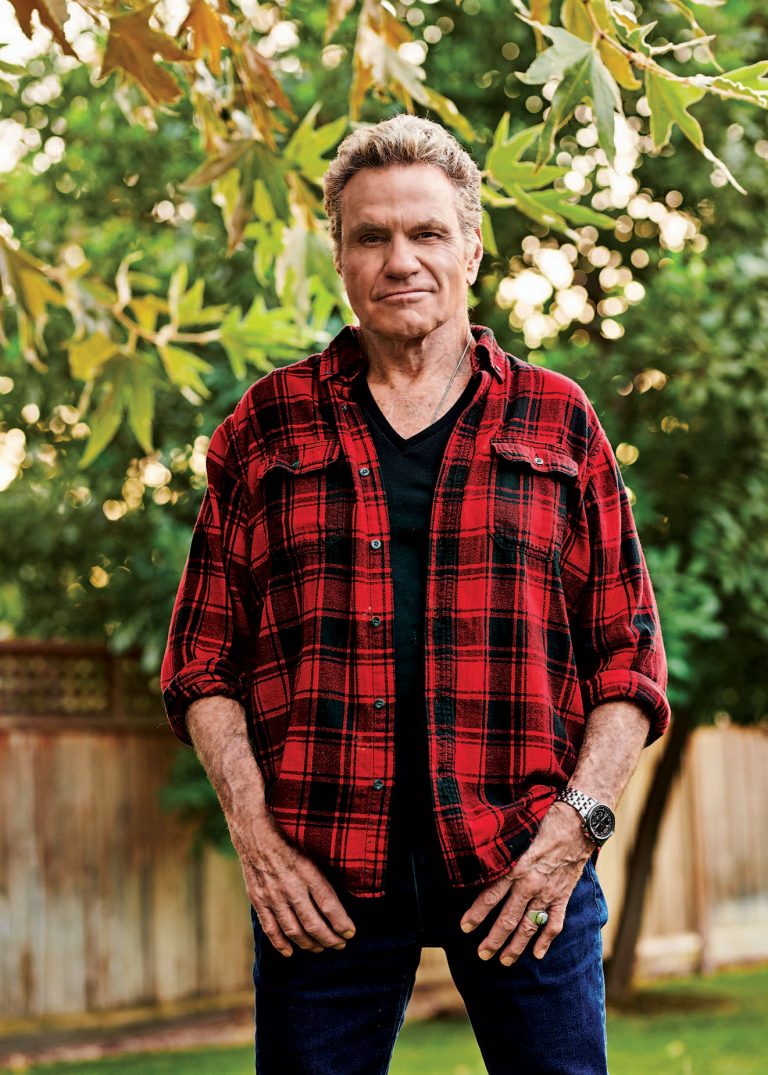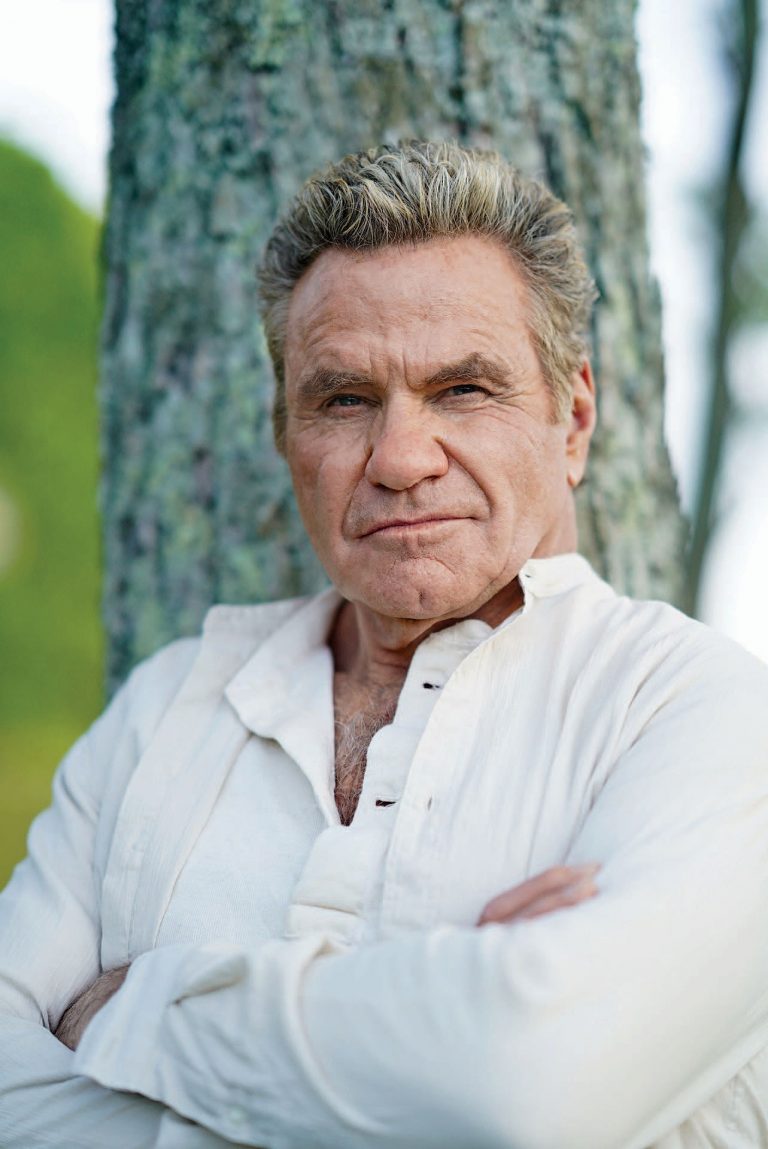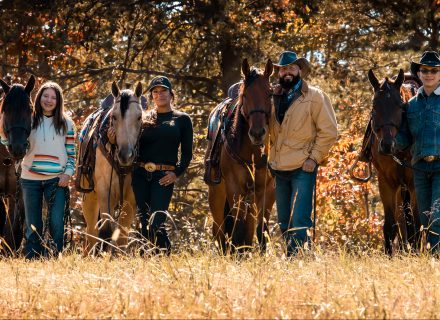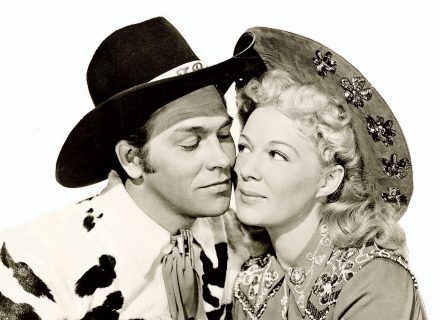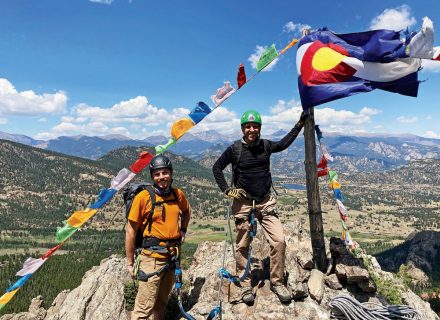Western movies and trail-ride memories are forever in the heart and mind of the veteran Cobra Kai star.
In his other life, Martin Kove is a cowboy.
Sure, the Brooklyn-born actor may be best known for his signature role as John Kreese, the ferociously demanding sensei introduced in The Karate Kid (1984) and its two sequels, and currently on view in the smash-hit Netflix series Cobra Kai. And nostalgic TV viewers might recall his multi-season run as Det. Victor Isbecki on Cagney & Lacey.
Take a close look at his other credits, however, and you’ll find a number of TV and movie westerns, ranging from a guest spot on the original Gunsmoke to a costarring part in Wyatt Earp (1994) — which called for his bad-guy character to punch Kevin Costner’s titular hero — to, most recently, his cameo in the faux TV series Bounty Law that introduces Leonardo DiCaprio’s Rick Dalton in Quentin Tarantino’s Once Upon a Time… in Hollywood.
Off-screen, Kove has eagerly participated almost every year since 1983 in an annual trek to Wyoming’s Hole-in-the-Wall — yep, the very place where Butch and Sundance used to lie low — so he and his friends can cowboy up. “We rent horses,” he said during a break from filming Cobra Kai, “and we ride for like eight hours a day, maybe 10 miles a day. We’re there five days in a base camp. And we dress in cowboy vintage clothing — no tennis shoes and baseball caps. And we have a great time.”
Fairly early on in my conversation with Kove, I couldn’t help being impressed with his diehard-fan, borderline-encyclopedic knowledge of western films and TV series — really, don’t try to one-up him in any trivia contest — and the sheer exuberance in his voice as he described what he’s looking forward to bringing to the new home he recently purchased in Tennessee.
“I’ve got 11 acres with a lake, and a broken-down barn, and an immaculate Tuscany Villa inside. And you know what’s going up on the walls? My house is a museum. I’ve got all these giant European movie posters for westerns, all hand-painted in French or Italian. Like, they called The Wild Bunch ‘La Horde Sauvage’ in France. That’s what you’ll see there.
“And you know,” he continued, “I’m going to get a couple of horses by the end of the year. The only thing in disarray is this barn, so I’m going to restore it. It’s got three stalls in it, and it’s going to be great. And I’m gonna get a period canoe to go in that lake, you know. I’ll get a canoe like right out of Last of the Mohicans.”
So just imagine a couple of western fans sitting in that canoe on that lake at twilight, talking about cowboys — and, of course, Cobra Kai.
Cowboys & Indians: So tell me, Martin — what is it like to punch Kevin Costner?
Martin Kove: [Laughs.] Yeah, the first scene I’m with him, and I have to punch him out. And when I do that — you know as a kid, sometimes you make a sound effect when you’re pretending to box? You go — kuh! kuh! kuh! — or something like that? Well, I habitually do it, every time I punch him. So, we did it four times. The sound guy keeps saying, “Hey, what is that sound? What is that sound? Every time Marty hits Kevin there’s that sound.” Now, you can’t see me do it, because I’m crossing my mouth with my right hand punching. But then I realize it’s me. Why, we’re four takes into the damn movie. And I think, “How unprofessional of me.” So I owned up to it. And everybody cracked up. They were hysterical — Kevin, [director Lawrence] Kasdan, the sound guy — because they knew that, as kids, they did the same thing. I got it clean on the fifth take, without making that sound. But I never lived that down for the entire time I was there — making my own sound effects in a $90 million movie.
C&I: What you’ve done with rebooting the Karate Kid movies as Cobra Kai — picking up the characters you, Ralph Macchio, and William Zabka played more than 30 years ago and placing them in the present day — probably is not unprecedented. But you could probably count the successful instances of this on the fingers of one hand. Did you have any qualms about attempting it?
Martin: Well, Ralph, Billy, and I had been going to autograph shows and seeing each other for years, and we knew the movies were still popular. And I personally think that the reason why it has been successful is because of the writers. Not only the writers of Cobra Kai on television — first on YouTube, and then on Netflix — but Robert Mark Kamen, who wrote the original movies. Of course, he doesn’t think that. He thinks that the charisma and the chemistry between Pat Morita and Ralph is what made it so exciting. But I still say the writing made it exciting. Look, we’re all still saying, “Sweep the leg,” “No mercy,” “Wax on, wax off.” We’re still saying it 35 years later. And if you think about the movies where certain lines are still quoted years and years later, things like, “Play it again, Sam,” or, “May the force be with you,” or, “Frankly my dear, I don’t give a damn” — the writing is what made those movies classics. You know? And I think that if this writing in Cobra Kai wasn’t as good as it is, this whole deal wouldn’t work.
C&I: What’s your fondest memory of the late John Avildsen, the director of the original Karate Kid movies?
Martin: My fondest memory of John Avildsen is what he told me once: “I didn’t hire you because you need direction. I hired you because you’re good enough and you can do your job by yourself, and whatever I need from you, you can do. That’s the reason I hired you — because you’re a good enough actor to do what I need done without me coaching you.” And, you know, it makes you feel good having a guy who directed Rocky and Joe — two terrific emotional movies — tell you that.
C&I: So it was a dream working with him right from the start?
Martin: [Laughs.] When I first met him, it was horrible. Really. I was given the script on a Monday. And the casting woman said, “You’ll have till Friday with this.” But then all of a sudden, the very next morning, I get a call: “You’ve got to meet [Avildsen] at noon on the set. They want to cast this role now.” I said, “But you gave me the whole week.” See, it was the scene where I’m marching up and down the hallway, saying things like, “Mercy is for the weak, here and on the streets.” “Defeat does not exist in this dojo.” “Fear does not exist in this dojo.” All those lines — and very angry lines. And, God, you know, I said to my wife, “Look at this, I got to go in an hour. I haven’t worked on this.”
And she said, “Take all the venom you feel for John Avildsen and the casting woman and use it in the reading. Just let them know how you feel and then go right into the reading.” So I went to reading with that dialogue. And I told John, “You’re a real asshole, John Avildsen. So are you, [casting director] Caro Jones. We wait for years to meet directors of your caliber. We fire our agents. We fire our managers just to meet directors like you. And now you give me no time with the script. You’re a goddamn asshole, John Avildsen. And so are you, Caro Jones.” And then I went right into “Mercy is for the weak, here and on the streets, when someone confronts you.” And they loved it. I never even got to finish it. They sent me to [producer] Jerry Weintraub. And I did the same thing to Jerry, because he was four days late. I was on pins and needles the whole time. I berated him just like that. And then I met the head of the studio. But I didn’t have the courage to do it to him.
C&I: Probably a smart move.
Martin: So I just did it in the bathroom, got real angry in the bathroom. And then bam! I came right out with that kind of headstrong feeling. And I did it with Pat Morita on the set and that was the clincher. But you know, I figure it just was meant to be. It just was meant to be.
C&I: There have been rumors that Quentin Tarantino actually wants to film five half-hour, black-and-white episodes of the fake TV western where you appear in Once Upon a Time… in Hollywood.
Martin: Bounty Law? He’s writing it now. And so I sent him a letter, it must be months ago, that I’d love to participate in Bounty Law. And I know he’s watched Cobra Kai. And that was before the airing of Season 3 on Netflix. I mean, after I got the offer to do Once Upon a Time… in Hollywood, I was at the pre-production party. And I walked up to Quentin and I asked, “Quentin, did you hire me for this role because I’ve been bugging you for three or four years to be in a western with you? Or did you give me this part because I’m hot from Cobra Kai?” And after a long pause, a big smile comes on his face, and he said, “A little bit of both.”
C&I: You know, I’ll bet there are people who got their first exposure to John Kreese and Daniel LaRusso and Johnny Lawrence in Cobra Kai, and have now gone back to look at the movies to see how it all started.
Martin: You’re a hundred percent correct. The kids that never saw the movies because they were too young, they now go back and watch the movies diligently. Like people that saw the movies that don’t really watch much TV — they go and watch Cobra Kai and they binge it. I was in Tampa a while ago, and I had 5-year-olds come up to me in a restaurant with their parents. They wanted pictures with me, with their cellphones. We take the pictures, and they say, “I love you in Cobra Kai.” OK, two hours later, I’m in Ybor City, at a cigar lounge buying some cigars, and a 67-year-old guy comes up to me with his wife. And he says, “We love you in the show, Mr. Kove.” And I was blown away. I said, “Well, where are you from?” He says, “Brooklyn.” And I said, “Hey, I’m from Brooklyn, too.”
C&I: Finally, to ask the obvious question — will we ever see you in another western?
Martin: I’m dying to find a western script that’s about an old gunfighter and a young kid — a 30-year-old kid, like my son, Jesse. I’m playing with this concept of whether it’s two brothers — older brother, younger brother — or a father and a son. But I’m trying to find the twist where a guy takes his guns off. For 20 years, he hasn’t picked up the guns, sort of like Gregory Peck in The Gunfighter. And then he has to pick up his guns at the end and defend some impossible purpose, some impossible cause — and he gets killed, of course. And whether he’s a bad guy who’s done terrible things in the past, like William Munny in Unforgiven, or whether he was framed, or whatever it is, he had to put his guns away because his family lost a lot of respect for him. And so I’m trying to find the twist: Why he had to put his guns down, and why he has to pick his guns up.
I mean, you have to get a guy like Tarantino, who writes so well, to make it work. Because nowadays, you’ve got to have really good writing in a western. It was such an overexposed genre from 1920 to 1967, when like one of every three movies that came out in Hollywood was a western. So you really have to dig down deep. The good guy, bad guy thing doesn’t really work. It’s gotta be like Cobra Kai, where everybody is gray. You know, in the original Karate Kid movies, it was black hats and white hats. Miyagi and Ralph were the white hats, Billy and I were the black hats.
But you’ve got to be more sophisticated in your writing now.
You can read about Martin Kove’s favorite westerns here.
Three seasons of Cobra Kai are available to stream on Netflix, and a fourth is on the way.
Photography: (White shirt) Curtis Bonds Baker/courtesy Martin Cove, (All others) Ray Kachatorian/courtesy Martin Cove
From our July 2021 issue.








